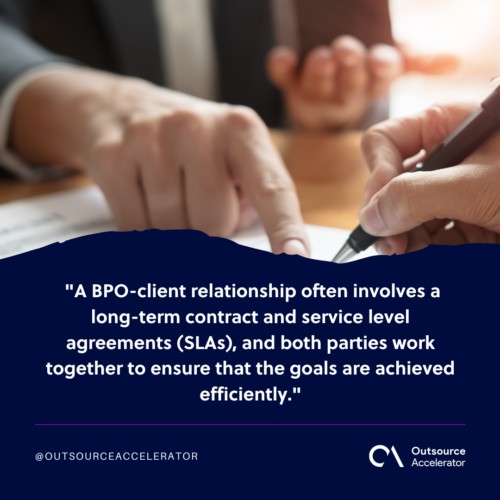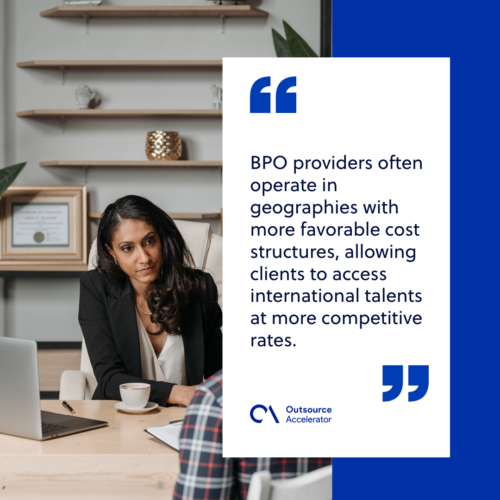Understanding the BPO-client relationship

Building and maintaining strong client relationships is crucial for success in any business. This holds true for the BPO industry as well.
Relationship management is an aspect that BPO companies strive to maintain. It is their lifeblood and foundation to provide the best service for their clients.
In establishing a BPO-client relationship, both parties work together to optimize their services and resonate these efforts with the customers.
This article will delve into the intricacies of the BPO-client relationship – what it entails, its benefits, and how to effectively manage it.
What is a BPO-client relationship?
A BPO-client relationship refers to the partnership between a business and its chosen BPO service provider. It involves outsourcing specific business processes to a third-party provider, such as customer support, IT services, or back-office operations.
The service provider is a trusted advisor that delivers top-notch services to the business while ensuring high quality.
A BPO-client relationship often involves a long-term contract and service level agreements (SLAs), and both parties work together to ensure that the goals are achieved efficiently.

Benefits of maintaining a BPO-client relationship
Establishing a strong, collaborative relationship with a BPO provider can offer several valuable benefits.
Let’s delve into these advantages in more detail:
Operational efficiency
One of the key advantages of a BPO-client relationship is enhanced operational efficiency. BPO providers are equipped with specialized knowledge and access to advanced technologies that can help streamline business processes.
This increased operational efficiency ultimately translates into cost savings and better overall business performance.
Cost savings
Cost savings are a significant benefit of outsourcing to a BPO provider. With a strong BPO-client relationship, businesses can tap into skilled resources at a fraction of local labor costs rather than maintaining in-house operations.
BPO providers often operate in geographies with more favorable cost structures, allowing clients to access international talents at more competitive rates.
Additionally, BPO relationships offer scalability, enabling businesses to adjust resources based on their needs.

Mitigated conflicts
Maintaining a BPO-client relationship can mitigate conflicts and foster a harmonious working environment.
Regular and open communication helps build trust and transparency. This reduces the risk of misunderstandings or conflicts.
Should any issues arise, the collaborative mindset established in a solid BPO-client relationship facilitates timely resolution. From here, disruptions are minimized, and the company maintains smooth operations.
Enhanced learnings
By leveraging their service provider’s knowledge and experience, clients can gain valuable insights leading to process improvements and innovation.
BPO providers are well-versed in leveraging cutting-edge technologies and trends that offer distinct competitive advantages. The continuous exposure to these learnings helps companies stay ahead of the curve and adapt to the evolving demands of their industry.
Increased retention
The partnership and trust built in a BPO-client relationship contribute to increased client retention.
BPO providers understand the importance of delivering quality service and meeting client expectations. Similarly, businesses benefit from a stable and reliable BPO partner who understands their unique needs and can consistently deliver the desired outcomes.
5 tips for managing BPO-client relationships
Here are five tips to help businesses navigate and maximize their partnerships with BPO providers:
1. Clearly define expectations
It is essential to establish clear goals and expectations from the outset.
Both parties should have a shared understanding of the desired outcomes and the metrics that will measure success.
Aligning expectations early on can prevent misunderstandings and lay the groundwork for a fruitful collaboration.
2. Foster effective communication
Communication is the cornerstone of any successful relationship, and a BPO-client relationship is no exception.
Effective outsourcing communication is vital to ensure smooth collaboration and timely information exchange.
Regular meetings, reports, and open lines of communication enable both parties to stay informed and address any challenges that may arise.
3. Build transparency
Trust is the foundation of any successful partnership. In a BPO-client relationship, trust is built through transparency and honest communication.
Sharing relevant information and upholding confidentiality helps foster trust between the client and the BPO provider. Trust, in turn, enables both parties to work together seamlessly towards achieving common goals.
4. Establish key performance indicators (KPIs)
Establish key performance indicators (KPIs) to monitor each outsourced function. These metrics provide measurable targets that reflect the desired outcomes.
Regularly tracking and analyzing KPIs allow businesses to gauge the effectiveness of the BPO partnership and make data-driven decisions to drive continuous improvement.
5. Nurture a collaborative partnership
Instead of viewing the BPO provider as a mere vendor, businesses should strive to nurture a collaborative partnership.
Engaging BPO providers as trusted advisors and involving them in strategic discussions can lead to valuable insights and innovative ideas.
A collaborative mindset fosters a sense of shared ownership and motivates both parties to go above and beyond to achieve mutual success.

Reaping the rewards of a successful BPO-client relationship
A successful BPO-client relationship can yield significant rewards for businesses.
By investing time and effort into managing the partnership effectively, businesses can unlock the full potential of their BPO relationships and pave the way for long-term success.
Building a successful BPO-client relationship takes time and effort, but the results can be game-changing.
Companies that successfully manage their BPO relationships can focus on their core competencies, allowing continued growth and innovation.
All in all, firms can struggle to scale independently as they grow, limiting their potential. Those that utilize BPO services are better equipped to handle surges in demand and ongoing growth.







 Independent
Independent




